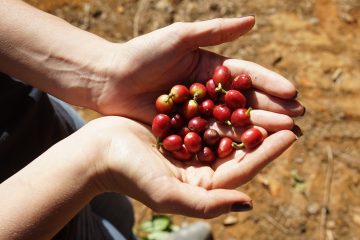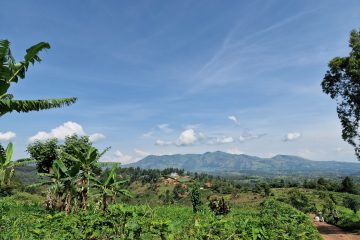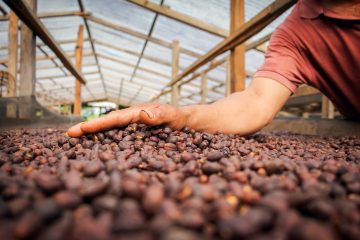
We recently received a range of coffees from the Fazenda Ambiental Fortaleza (FAF). This is a good mix of coffees from small to medium sized separated lots of different varietals and from different local municipalities. This is based on a concept where FAF is growing and processing their own coffee, while also running a coffee initiative to develop a great range of products from the neighboring farms. We think this is a unique concept for Brazil and the flavor profiles are really complex and interesting compared to many other Brazilians we have tasted.
Fazenda Ambiental Fortaleza is owned and run by Marcos Croce and his wife Silvia. Since they took over the farm, after Silvia inherited it from her family, they have been transforming the farm towards organic production.
Marcos and Silvia’s son (and our good friend) Felipe is now running the quality control and development of quality on the farm. He is actively experimenting with new ways of drying and producing coffee. This has resulted in some of the cleanest natural processed coffees we have ever tried coming out of Brazil. Although their altitude is not the highest, the coffees still have great character and sweetness due to the delicate drying process where the coffee cherries are picked at a very uniform ripening stage and all unripe coffees are sorted out by hand during drying.

Marcos and Silvia are very concerned about their local environment and have partnered up with a lot of farmers in the area to help them move towards sustainable farming and improved quality, in an effort called the Bobolink coffee project.
We are doing a mixed range of coffees from FAF and the Bobolink project. Some of the coffees are grown, picked and produced by the Croce family at Fazanda Ambiental Fortaleza. Other coffees are from the Bobolink project, where they are either picked and processed (dried) at a small holder farm like Sitio Canaa, or picked at a farm like Laranjal but dried and processed at Fazenda Fortaleza, where they have the structure in place, and the farmer only have his plot of land. Either way, when the coffees are separated out of the Bobolink project as single farms, it is because there is some uniqueness in the cup.
On top of that, all these coffees are sold as lots where you very often know the cultivars, time of picking etc.

Their coffees are not the cheapest in Brazil. This is because the yield when growing organic coffee is very low, the cost is high and the Brazilian economy, especially in Sao Paulo state is booming. However, after visiting their farm and tasting their coffees 3 years in a row we had no other choice but to buy some.

There are many farmers in the Bobolink project that are still producing great coffees, but because of lot sizes or the cup profile they will go in to a blend and sold as Bobolink.

Below is a quote by Marcos from their Bobolink web site
We changed the farm name to Fazenda Ambiental Fortaleza (Environmental Fortress Farm) and immediately banished all toxic materials, protected the springs, created green corridors for the wild life, and begun the process of bringing awareness to our people at the farm.
We started to ad fruit trees to our coffee plantations ( such as bananas, mango, avocado) and coffee seedlings to our secondary forests.

We also started to motivate our people to continue education and promoted social integration, personal development, healthy and natural eating habits, and personal skills.
Although we were having very positive progress, we later learned that it was not enough to save FAF. The water from our springs run clean at FAF, but continue to the neighbors; the birds that nest at FAF fly all over, people come and go…..
We decided to expand our area and invite our neighbors to to join us in protecting the environment and create a much wider free and clean zone for the “Bob-o-Links”.

The Bob-o-Link Coffee is a result of a network of farmers, located in one of the best regions for coffee in Brazil, which have in common the vision of producing the best coffees, with sustainable agriculture methods, that reduce the “heavy footprints” of humans on earth, promoting harmony between men and our Nature.
The Bob-o-Link coffees are produced mostly in the Mountain Mogiana Region ( States of São Paulo and Minas Gerais), at altitudes that vary from 900m to 1,400m high, with Arabica coffee varieties such as Bourbon, Mundo Novo and Catuai.
Most of our FAF coffee farmers are formed by small properties , run by single or extended families, located at the top of the mountains, the perfect environment for the best coffees. The beans are picked selectively and dried in terraces next to their homes, close to their eyes.

Since these farms are on the top of the mountains, most have more that one spring in their property. The tradition is that only the first user gets clean water, due to improper dispose of waste and due to the agro-toxics used on the land. Also, the top of the mountains have always been covered by the Rainforest trees. But to maximize the use of the land for more production area…..the trees are the first to go and the sprigs get full sun exposure….

The Bob-o-Link farmers are part of the FAF network that will promote awareness for the increase of Quality Coffee that keeps the springs protected, create green corridors on the water ways, reduce the use of toxic material, and keep the trees to shade the coffee and create a healthy place for people and for the Bob-O-Links.
The Bob-o-Link Coffee has the mission to deliver the Finest Quality Coffees with the message of Awareness of Preservation and Culture Integration.
Our goal is to allow the “Bob-o-Link” flocks of all spices back and to spread the Sustainability seeds for a better, healthier, happier and peaceful world.
Marcos Croce



